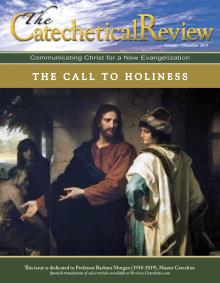Too often, those responsible for adult faith formation in their parishes set aside the Catechism of the Catholic Church as too difficult and thus too daunting for their audience. Or they might consider it not relevant to people’s experience, not practical or personal enough, or uninspiring. To overlook the Catechism as a foundational resource in adult faith formation would be to do the People of God a great disservice. The Catechism is a gift from the Church—or more properly, from the Holy Spirit, working through the successors of the apostles, to all the members of Christ’s Body. In his apostolic constitution on the Catechism, Pope John Paul II says clearly that the Catechism is “offered to all the faithful who wish to deepen their knowledge of the unfathomable riches of salvation (cf. Eph 3:8).” It is not a dry document, but one packed with life. It is “oriented toward the maturing of … faith, its putting down roots in personal life and its shining forth in personal conduct (CCC 23). The Catechism is a formative document—it has the power to transform the hearts and minds of those who read it.
The Catechism is a powerful instrument of formation because it expresses so clearly and so beautifully the truths of the Christian mysteries, and their interconnection with one another. Each doctrine is seen in relation to the central truths of the Trinity, the Paschal Mystery, the Church, and the dignity of the human person. Each doctrine is presented through its foundations in Sacred Scripture—with its power to penetrate minds and hearts, and through its sources in the Tradition, as expressed in the Church fathers and doctors, the councils, and the saints. The truths are presented in their richness and depth. The human person finds this beauty, order, coherence, and depth compelling. There is a fundamental principle at work here: the truth (of revelation), when expressed in a manner adequate to itself (that is, beautifully) speaks to our hearts and minds, drawing us into itself. In all the doctrines, we behold the form of Christ, and are enraptured (to borrow a phrase from Hans Urs von Balthasar): we are captivated in such a way that we are drawn to respond to Christ himself with the surrender of faith. In short, beauty converts.
Encountering the Catechism: a Few Illustrations
I’d like to share a few examples of the formative power of the Catechism. One of my neighbors became interested in Catholicism. He peppered me with questions whenever he saw me in our common parking lot. I answered many of these, but one day when he asked me about purgatory; I had little time and just decided to give him a copy of the Catechism. I directed him to the relevant pages, including the context of the four last things. He came back the next day, excited. Though not at all an educated man, he had read the section thoroughly, as well as looking up other topics. He was amazed by the logic of the presentations, and how Catholicism made everything “fit together.” He even explained it back to me quite well. A few days later, he told me that he wanted to become a Catholic.
When teaching the Ten Commandments to adults, I have found the presentation in the Catechism extremely effective. For example, people were astonished at the scope of each commandment. To learn that “Honor thy father and mother” included the role of the Christian family, caring for elderly parents, and the criteria for civil disobedience enabled them to view the commandments not just as items to be ticked off in preparation for confession, but as the basis for reflection on the nobility of the Christian call. The presentation of the eighth commandment—“you shall not bear false witness”—led to a discussion of why truth was important, awe at its ultimate expression in martyrdom, and how seemingly little offenses against the truth, such as gossiping, can do serious damage. The participants were sober after this session, and ready to re-evaluate their ways of speaking.
The rest of this online article is available for current Guild members.
This article is from The Catechetical Review (Online Edition ISSN 2379-6324) and may be copied for catechetical purposes only. It may not be reprinted in another published work without the permission of The Catechetical Review by contacting [email protected]


















